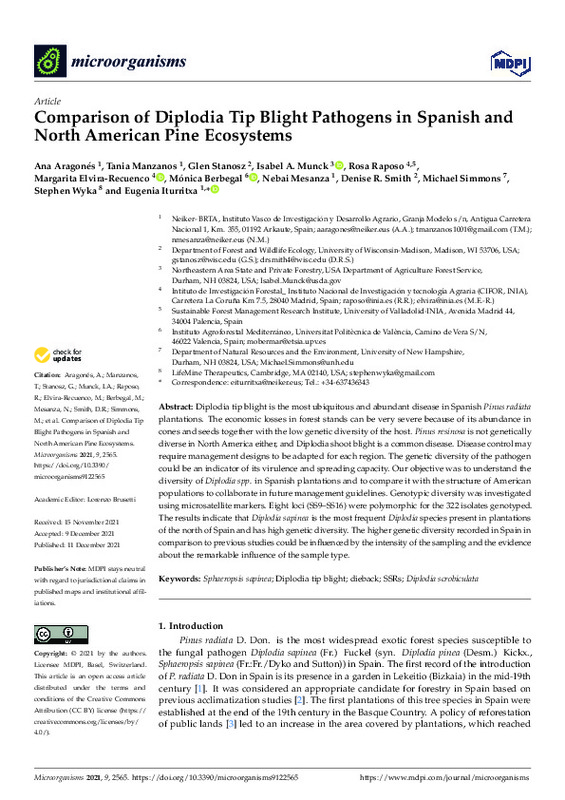JavaScript is disabled for your browser. Some features of this site may not work without it.
Buscar en RiuNet
Listar
Mi cuenta
Estadísticas
Ayuda RiuNet
Admin. UPV
Comparison of Diplodia Tip Blight Pathogens in Spanish and North American Pine Ecosystems
Mostrar el registro completo del ítem
Aragonés, A.; Manzanos, T.; Stanosz, G.; Munck, IA.; Raposo, R.; Elvira-Recuenco, M.; Berbegal Martinez, M.... (2021). Comparison of Diplodia Tip Blight Pathogens in Spanish and North American Pine Ecosystems. Microorganisms. 9(12):1-17. https://doi.org/10.3390/microorganisms9122565
Por favor, use este identificador para citar o enlazar este ítem: http://hdl.handle.net/10251/182115
Ficheros en el ítem
Metadatos del ítem
| Título: | Comparison of Diplodia Tip Blight Pathogens in Spanish and North American Pine Ecosystems | |
| Autor: | Aragonés, Ana Manzanos, Tania Stanosz, Glen Munck, Isabel A. Raposo, Rosa Elvira-Recuenco, Margarita Mesanza, Nebai Smith, Denise R. Simmons, Michael Wyka, Stephen Iturritxa, Eugenia | |
| Entidad UPV: |
|
|
| Fecha difusión: |
|
|
| Resumen: |
[EN] Diplodia tip blight is the most ubiquitous and abundant disease in Spanish Pinus radiata plantations. The economic losses in forest stands can be very severe because of its abundance in cones and seeds together with ...[+]
|
|
| Palabras clave: |
|
|
| Derechos de uso: | Reconocimiento (by) | |
| Fuente: |
|
|
| DOI: |
|
|
| Editorial: |
|
|
| Versión del editor: | https://doi.org/10.3390/microorganisms9122565 | |
| Código del Proyecto: |
|
|
| Agradecimientos: |
This research was funded by INIA, grant number: RTA 2017-00063-C04-03, LIFE programme, grant number: LIFE14 ENV/ES/000179 and by the Basque Government, grant number
FUNGITRAP 19-00031. Red pine cone collection in New England ...[+]
|
|
| Tipo: |
|









